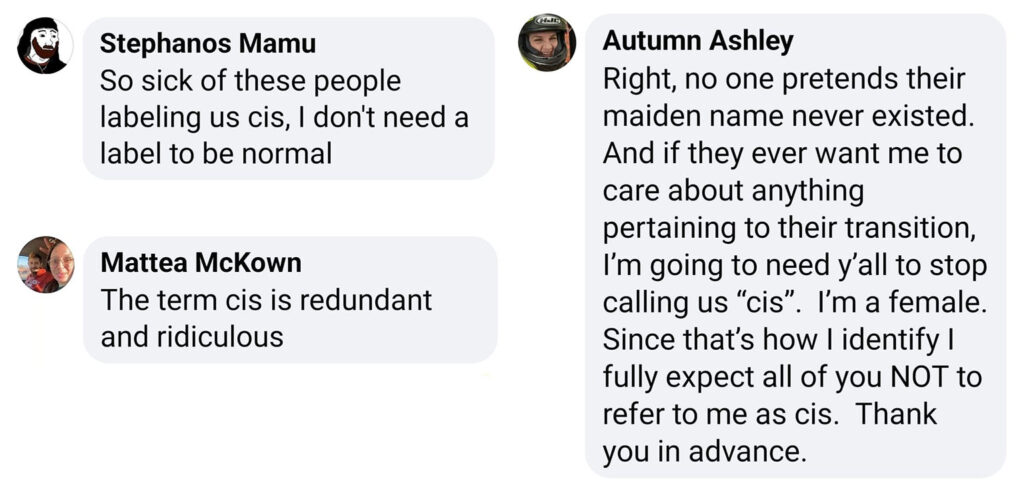Cisgender (or cis) is a term that has become increasingly prevalent in contemporary discussions surrounding gender identity. So what is cisgender and where does the term come from? Let’s explore the origins of the term, and why gender critical people get so upset about being called ‘cis’.
So what is cisgender?
Firstly, it is necessary to understand the distinction between sex and gender. Sex refers to the biological and physical characteristics that distinguish males and females. Gender is a social and cultural construct that encompasses the behavioral, cultural, and psychological traits associated with being male or female. Cisgender people are those whose gender identity matches the sex they were assigned at birth. For example, if someone was assigned male at birth and identifies as male, they are considered cisgender. That is to say, they’re not transgender.
The Origins of the Term Cisgender
The concept of cisgender identity is not a new one. The term “cisgender” comes from the Latin prefix “cis,” which means “on this side of.” In this context, “cisgender” means that a person’s gender identity is on the same side as their assigned sex at birth.
The earliest use of the term “cisgender” dates back to the 1990s when it was used in academic literature to describe non-transgender people. Prior to this, terms like “biological sex” and “natal sex” were used to describe the sex someone was assigned at birth.
It wasn’t until the mid-2000s that the term “cisgender” began to gain wider recognition, particularly within the transgender community. As more people began to understand the difference between cisgender and transgender identity, the term became more widely used.
The Importance of Recognizing Cis Privilege
We have to acknowledge that cisgender people experience privilege in a society that heavily values gender conformity. As a result, cisgender individuals often have access to social, economic, and political opportunities that are not available to transgender individuals. This privilege is especially significant in the context of healthcare, where cisgender individuals often receive better quality care than their transgender counterparts. In addition, let’s not forget that no-one was ever persecuted, discriminated against or murdered for being cisgender.
Then why do people get upset when they are called cisgender?
The simple answer is surprise, surprise… bigotry. Some people might get upset when they are called cisgender because they feel that the term is unnecessary while equating “normal” with being cisgender. Some people might also feel that the term is overly political or that it is being used to divide people into different groups.

It’s important to remember that the term cisgender is not intended to be derogatory or to imply that being cisgender is a bad thing. It is simply a term that is used to describe people whose gender identity aligns with the sex that they were assigned at birth. It’s that simple. No need for cis people to get their nickers in a twist over being called something that they are! It’s just a new word. Learn it and move on!
What is Cisnormativity?
Cisnormativity refers to the assumption that everyone is cisgender and that cisgender identities are the norm. This assumption can lead to discrimination against transgender individuals and a lack of understanding about the diversity of gender identities.
For example, a transgender person may face challenges in accessing healthcare or employment because of assumptions about their gender identity. By recognizing the existence of cisnormativity and working to address it, we can create a more inclusive society for all individuals, regardless of their gender identity.
Frequently Asked Questions about being Cisgender
Q: Is cisgender the same as heterosexual?
A: No, cisgender and heterosexual are two different aspects of identity. Cisgender refers to gender identity, while heterosexual refers to sexual orientation
Q: Can someone be both cisgender and LGBTQ+?
A: Yes, someone can be cisgender and still identify as LGBTQ+. While cisgender individuals identify with the gender they were assigned at birth, their sexual orientation may vary. For example, a cisgender person could identify as gay, bisexual, or queer.
Q. Why can’t I use the term “normal” to describe cisgender individuals?
A: To use the term “normal” to describe cisgender individuals implies that transgender individuals are abnormal, which perpetuates harmful stereotypes and contributes to the marginalization of the transgender community.
As our understanding of gender identity continues to evolve, it’s important to remain open-minded and empathetic towards those who identify differently than ourselves.
